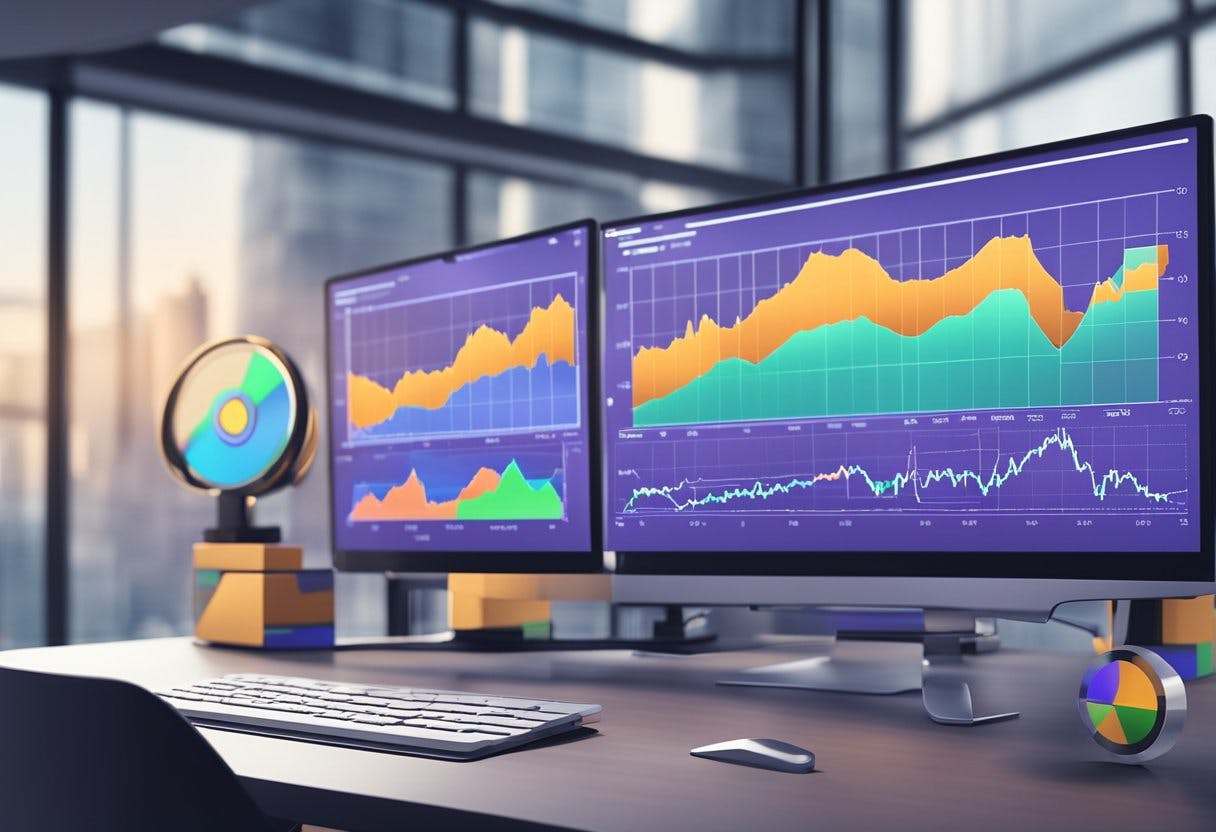
Crypto tools are essential for anyone looking to navigate the complex world of cryptocurrency. With the rise of digital assets, it is becoming increasingly important to understand the various tools available for trading, analyzing, and securing your digital assets. From market indicators to crypto exchanges, these tools can help investors make informed decisions and maximize their profits.

One of the most essential crypto tools is understanding market indicators. These indicators can provide valuable insights into market trends, allowing investors to make informed decisions about when to buy or sell their digital assets. By analyzing market data and tracking key indicators, investors can gain a better understanding of market trends and make more informed decisions.
Navigating crypto exchanges is another important aspect of using crypto tools. With so many exchanges available, it can be difficult to know which ones are reliable and secure. By understanding the different features and fees associated with each exchange, investors can choose the one that best fits their needs and maximize their profits.
Key Takeaways
- Essential crypto tools include understanding market indicators, navigating crypto exchanges, and securing your digital assets.
- By analyzing market data and tracking key indicators, investors can make informed decisions about when to buy or sell their digital assets.
- Choosing a reliable and secure crypto exchange is crucial for maximizing profits.
Essential Crypto Tools

When it comes to navigating the world of cryptocurrency, having the right tools at your disposal can make all the difference. Here are some essential crypto tools that every investor should consider:
Trading Platforms
Trading platforms are the gateway to the world of crypto trading. They allow you to buy and sell cryptocurrencies, and can vary greatly in terms of fees, security, and user-friendliness. Some of the most popular trading platforms include Binance, Coinbase, and Kraken. Each platform has its own strengths and weaknesses, so it’s important to do your research and choose the one that best fits your needs.
Data Aggregators
Data aggregators are essential for keeping up-to-date with the latest news and trends in the crypto industry. They allow you to track market movements, monitor social media sentiment, and stay informed about new developments in the space. Some popular data aggregators include CoinMarketCap, CoinGecko, and CryptoCompare.
Portfolio Trackers
Portfolio trackers are a must-have for any serious crypto investor. They allow you to keep track of all your investments in one place, monitor your portfolio’s performance, and set alerts for price movements. Some popular portfolio trackers include Blockfolio, Delta, and Crypto Pro.
When choosing a portfolio tracker, it’s important to consider factors such as security, ease of use, and compatibility with your preferred trading platform. Additionally, some portfolio trackers offer advanced features such as tax reporting and integration with hardware wallets.
Overall, having the right crypto tools at your disposal can help you navigate the complex world of cryptocurrency with confidence and ease. Whether you’re a seasoned developer or a novice investor, there’s a tool out there that can help you achieve your goals.
Understanding Market Indicators

Market indicators are essential tools for crypto traders and investors to make informed decisions. They provide valuable insights into the market trends, volatility, and potential price movements. Here are the three main types of market indicators:
Technical Analysis
Technical analysis is a popular method used to predict future price movements based on historical market data. It involves analyzing charts and using technical indicators to identify trends and patterns. Some popular technical indicators include Moving Averages, Relative Strength Index (RSI), and Bollinger Bands.
Technical analysis tools are widely used by traders and investors to identify entry and exit points, set stop-loss orders, and manage risk. These tools are available on various platforms, including CoinMarketCap, TradingView, and CryptoWatch.
Market Data
Market data is real-time information about the prices, trading volume, liquidity, and market capitalization of cryptocurrencies. This data is crucial for traders and investors to make informed decisions about buying or selling digital assets.
CoinMarketCap is a popular platform that provides real-time market data for thousands of cryptocurrencies. It includes relevant metrics such as top gainers, top losers, and trading volume. By analyzing this data, traders can identify potential investment opportunities and avoid high-risk assets.
On-Chain Analysis
On-chain analysis is a method of analyzing the blockchain to gain insights into the behavior of market participants. It involves tracking social volume, developer activity, and the number of commits to the codebase.
On-chain analysis tools are useful for identifying trends and predicting future price movements. Some popular on-chain analysis platforms include Glassnode, Santiment, and CryptoQuant.
In conclusion, understanding market indicators is crucial for crypto traders and investors to make informed decisions. Technical analysis, market data, and on-chain analysis are the three main types of market indicators that provide valuable insights into the market trends, volatility, and potential price movements. By using these tools, traders can identify potential investment opportunities and manage their risk effectively.
Centralized Exchanges
Centralized exchanges (CEX) are the most common type of crypto exchange. They are run by a centralized authority and require users to deposit funds into their accounts before trading. Some of the most popular CEXs include Binance, Coinbase, Kraken, and Coinbase Pro.
CEXs offer a range of trading options, including spot trading and futures trading. Spot trading allows users to buy and sell cryptocurrencies at the current market price, while futures trading allows users to speculate on the future price of a cryptocurrency. CEXs also typically support fiat currencies, making it easier for new users to enter the market.
However, CEXs are not without their drawbacks. They are vulnerable to hacking and theft, and users must trust the exchange to hold their funds securely. Additionally, CEXs often charge high fees for trading and withdrawals.
Decentralized Exchanges
Decentralized exchanges (DEX) operate on a peer-to-peer network and do not rely on a centralized authority. They allow users to trade cryptocurrencies directly with each other, without the need for an intermediary. Some popular DEXs include Uniswap, PancakeSwap, and SushiSwap.
DEXs offer a higher level of security and privacy than CEXs. Since users hold their own private keys, there is no risk of a centralized authority being hacked or compromised. Additionally, DEXs typically charge lower fees than CEXs.
However, DEXs have their own set of challenges. They often have lower liquidity than CEXs, which can make it difficult to trade large volumes of cryptocurrencies. They also have a steeper learning curve, as they require users to have a basic understanding of how to use a crypto wallet.
In conclusion, both CEXs and DEXs have their pros and cons. It is important for users to do their own research and choose an exchange that meets their individual needs.
Securing Your Digital Assets
When it comes to dealing with digital assets, security should always be a top priority. Here are some tips to help keep your crypto safe and secure.
Crypto Wallets
A crypto wallet is a software program that stores your private and public keys and interacts with various blockchain networks to enable you to send and receive digital assets. There are several types of crypto wallets, including desktop, mobile, web, and hardware wallets.
Desktop wallets are software programs that you download and install on your computer. They provide a high level of security, but you need to make sure that your computer is free of malware and viruses.
Mobile wallets are apps that you can download onto your smartphone. They are convenient and easy to use, but they are less secure than desktop wallets.
Web wallets are online services that you can access through a web browser. They are convenient, but they are also less secure than desktop wallets because they are vulnerable to hacking attacks.
Hardware wallets are physical devices that store your private keys offline. They are the most secure type of crypto wallet, but they can be expensive and less convenient to use.
Hardware Wallets
Hardware wallets are the most secure way to store your digital assets. They are physical devices that store your private keys offline, which means that they are not vulnerable to hacking attacks.
Hardware wallets come in various shapes and sizes, but they all work in the same way. You connect the device to your computer or smartphone, enter your PIN, and then use the device to sign transactions.
Some of the most popular hardware wallets include Trezor, Ledger Nano S, and KeepKey. These devices are easy to use and provide a high level of security. However, they can be expensive, and you need to make sure that you keep your recovery seed phrase safe.
In summary, securing your digital assets is essential to prevent unauthorized access and theft. By using a secure crypto wallet and hardware wallet, you can protect your private keys and ensure the privacy and security of your digital assets.
Frequently Asked Questions
What are some popular crypto analysis tools?
There are various crypto analysis tools available in the market, but some of the popular ones are TradingView, CoinTracking, and CryptoCompare. TradingView is a charting platform that provides real-time data and technical analysis tools. CoinTracking is a portfolio management tool that tracks all your crypto transactions and generates tax reports. CryptoCompare is a platform that provides live market data, news, and analysis of various cryptocurrencies.
What are the best resources for crypto research?
There are many resources available for crypto research, but some of the best ones are CoinMarketCap, CoinGecko, and CryptoSlate. CoinMarketCap is a platform that provides real-time market data, charts, and news for cryptocurrencies. CoinGecko is a similar platform that provides market data, charts, and analysis for various cryptocurrencies. CryptoSlate is a platform that provides news, analysis, and research on blockchain and cryptocurrency projects.
What desktop app is recommended for crypto trading?
One of the most popular desktop apps for crypto trading is Binance Desktop. It is a user-friendly app that provides real-time data, charts, and trading tools for various cryptocurrencies. It also has a built-in wallet and supports more than 150 cryptocurrencies.
What are some common words associated with crypto tools?
Some common words associated with crypto tools are blockchain, cryptocurrency, wallet, exchange, trading, mining, and portfolio management. These words are often used in the context of various crypto tools and platforms.
What are some examples of crypto tools on GitHub?
There are many crypto tools available on GitHub, but some of the popular ones are Gekko, Zenbot, and Blackbird. Gekko is an open-source platform for automating trading strategies. Zenbot is a command-line cryptocurrency trading bot that supports multiple exchanges. Blackbird is an open-source arbitrage bot for Bitcoin exchanges.
What are some essential tools for managing crypto on Binance?
Some essential tools for managing crypto on Binance are Binance Desktop, Binance Mobile, and Binance Web. Binance Desktop is a desktop app that provides real-time data, charts, and trading tools for various cryptocurrencies. Binance Mobile is a mobile app that allows users to trade and manage their crypto assets on the go. Binance Web is a web-based platform that provides real-time data and trading tools for various cryptocurrencies.
Read More




